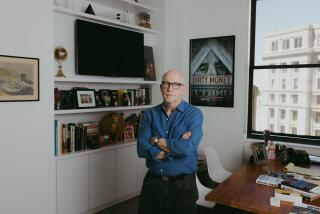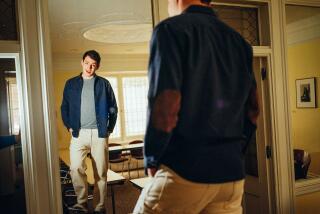Simon’s Triumph : Singer’s South African Concerts Are Joyous, Peaceful Affairs
- Share via
JOHANNESBURG, South Africa — Paul Simon came full circle this weekend in his 6-year-long journey into South African music with two joyous and peaceful concerts that he once doubted he would ever be allowed to stage.
A crowd estimated by the promoters at more than 45,000 danced and cheered through the opening concert Saturday, and perhaps half as many showed up Sunday to celebrate the first major international shows in South Africa since the phased lifting of the cultural boycott last year.
The heavily hyped threats of “massive protests” turned out to be nothing more than a half-hearted march by 60 or 70 far-left opponents of the tour at one stadium gate at the opening concert Saturday, and none the next day. The protesters, from the small Black Consciousness-oriented Azanian People’s Organization, were escorted up and down the street by mounted police and went unnoticed by most concert-goers.
Inside, on the field facing the stage, fans of every hue joined hands in circles, held cigarette lighters aloft and lived out the other rituals of big-time concerts long denied them because of the apartheid system of white-minority rule.
Simon thus achieved his stated goal in bringing his Born at the Right Time tour here that “for a few hours, the people of South Africa can put aside their differences and just enjoy the music.”
In an interview Sunday before the second show, Simon recalled the days of his 1987 Graceland tour, when he ventured no closer than neighboring Zimbabwe to play the music that was spawned in his much-criticized visit to Johannesburg in 1985.
“Never in Zimbabwe did we think we would be permitted to play in South Africa,” Simon said. “Now, the opportunity to come here and end this tour of 14 months in South Africa was so appealing--the chance to have everything so symmetrical and conclude this six-year odyssey where it began.”
For that reason, he said, it was disappointing to learn that some groups still protested his appearance and threatened to block it with violence, and gratifying that the threats proved hollow and the shows were festive.
“It was a very special show,” Simon said. “I was delighted with the support of the audience, the degree to which they were excited and pleased that we showed up after all the hassles we went through this week.”
As she staked out her place on the field, Monica Wright said that she and her family had boycotted sanctions-busting tours in the past and her hopes had faded of ever seeing Simon and Garfunkel, her favorite artists.
“I thought that by the time they come here they’ll be in wheelchairs,” said Wright, who is 58. “It’s wonderful that this is all happening so soon. It’s symbolic of the changes here and the reawakening of South Africa.”
The opening-night crowd filled little more than half of the 70,000-seat Ellis Park Stadium, home of the Transvaal rugby team. Apart from some older Simon and Garfunkel-era fans, most were South African yuppies of all races--white, black, Asian and “Coloured,” as mixed-race people are known--who were more keen to hear the “Graceland” album tunes.
The band of picketers called their protest “Born at the Wrong Time,” and held up banners saying, “Blood on the soles of your shoes, Paul,” and “No Vote, No Show.”
George Ngwenya, publicity secretary of the Azanian organization’s youth wing, said: “We are happy that black people have heeded our call. Look inside. It’s only the white community there. This is a victory of black people over white people.”
More than 80% of the audience was white, concentrated in the grandstand and the posh corporate suites that ring the stadium, while most blacks were on the unreserved field.
Several blacks said that the steep admission, from 40 rand ($16) for the field up to 83 rand ($31) for the best box seats, prevented many more from coming. Whites said the prices and the veiled threats of violence from the Azanian, especially a hand-grenade explosion outside the promoter’s office earlier in the week, had discouraged others, including some with tickets.
Simon acknowledged before the show that the tickets were inaccessible for many blacks. He said he would have liked to offer cheaper seats but that the five-concert, four-city tour was already deeply in the red and would lose between $150,000 to $200,000.
The shows drew heavily from “Graceland,” the pioneering 1986 album that got Simon in trouble with the African National Congress and other anti-apartheid groups. The performers included several South African stars with whom Simon wrote and recorded “Graceland,” including guitarist Ray Phiri of the band Stimela and Ladysmith Black Mambazo, an a capella group whose polyphonic rhythms contributed to “Graceland’s” cross-cultural tone.
Simon dedicated the tour to Headman Shabalala, a co-leader of Ladysmith who was shot dead recently by an off-duty white security guard during an argument. Simon has complained that the suspect was released on the equivalent of only $360 bail.
Other than that comment, Simon refused to engage in debate on South Africa’s halting transition from white rule to a new constitution that would give a vote to all. Nor did he refer to the internecine squabbling that pitted the Azanian group against the tour and the African National Congress in favor. The concert was pure music; he issued no messages between songs.
“I would prefer not to use words like vindicate ,” he told a news conference earlier. “I am just pleased that the rift with the ANC has healed and to find the ANC is supporting me.”
The tour closed the circle since his first visit here in early 1985, when he quietly met with black musicians and began exploring the themes that led to “Graceland.” Simon was briefly put on the United Nations blacklist, accused of violating the cultural boycott, despite approval from the black musicians’ union for that project.
“Graceland” brought the vibrant “Township Jive” syncopations to world attention, but the subsequent tour in 1987 came only as close as Zimbabwe, because Simon heeded the boycott and refused to perform in South Africa. The Born at the Right Time tour added several of the Brazilian and West African artists from Simon’s “Rhythm of the Saints” album that followed “Graceland” and built on his South African sounds.
This tour was rich in the ironies that the political transition has wrought since 1985, when African National Congress leader Nelson Mandela was still in jail, the Congress was outlawed and a state of emergency sought to suppress uprisings in the black townships.
On the evening before the first show, Mandela hosted a cocktail party for Simon at a plush downtown hotel. Among the guests was Pik Botha, the foreign minister, who once led the campaign to vilify the African National Congress as a terrorist organization and who now touts the prospect of a peacefully negotiated settlement. The Zulu-based Inkatha movement, a Congress foe, also endorsed the tour.
More to Read
The biggest entertainment stories
Get our big stories about Hollywood, film, television, music, arts, culture and more right in your inbox as soon as they publish.
You may occasionally receive promotional content from the Los Angeles Times.










